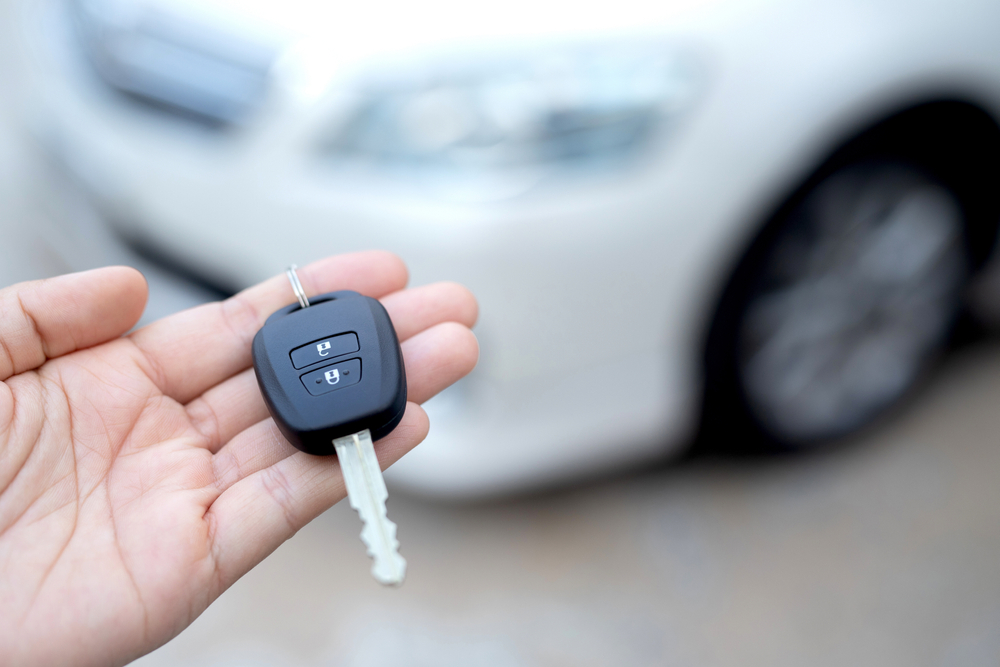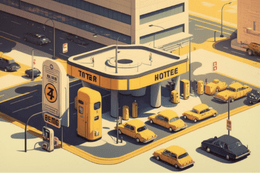A car loan with no down payment makes it easier for borrowers to purchase a vehicle without putting up a dime. This loan appeals most to consumers with good credit who do not intend to take on excessive debt. Some lenders offer specialized financing solutions for people who do not qualify for a conventional loan.

Needless to say, cashless auto loans provide an immediate liquidity advantage to individual borrowers. However, this opportunity has drawbacks that potential renters should be aware of. This guide outlines the essentials for a wise and careful financial decision.
What is the meaning of a “no down payment” car loan?
This type of loan is granted without the borrower having to make a deposit. As a result, the client does not have to spend hundreds of dollars initially in cash.
Such convenience, however, is not without cost. Borrowers financing the entire purchase price of the vehicle pay higher interest costs during the loan term.
“It’s important to keep in mind that this convenience does come at a cost,” said Sashi Lenoa, senior credit analyst at American Credit. “Borrowers who finance the full price of their vehicle may end up paying higher interest costs over the course of their loan term.”
The purpose of lenders asking for down payments
Any loan involves certain risks, so lenders have an interest in mitigating them. If not, they risk going bankrupt by making bad loans. It only takes a minor disproportion of borrowers who default on their loans to destabilize the lender’s financial position.
Deposits involve borrowers more in the loan, as they cause consumers to put up their own money. Thus, earnest money payments minimize the risk to lenders. They also reduce the lender’s losses in case of non-payment by the borrower[1].
All about down payments
Usually, they are related to large purchases, such as expensive furniture, new or used cars, and buildings. People often cannot afford to pay for these acquisitions in cash and therefore opt for financing in the form of a loan.
Lenders usually require an upfront fee when financing such things as cars and homes. This advance payment is known as a down payment. As per the Kelley Blue Book, automobile buyers deposit at least 10% of the vehicle’s selling price[2].
What are the eligibility criteria for these car loans?
We distinguish two main types of no-deposit car loans. The first kind is for borrowers with a strong credit rating[3]. The second is for those with limited savings and a low credit score.
For those with a good credit rating, these loans have favorable terms. In a way, they reward those who meet the qualifications. The second type involves much more risk. Interest rates are generally very high, and there is little room for manoeuvre for borrowers who do not meet their deadlines[4].
Regardless of the case, lenders consider three key criteria when screening applicants:
#1. Credit report
Your current level of debt is only one side of the picture. Creditors will also look at your credit history to determine how much of a risk you might be.
One of the things they will look at closely is how good your credit score is. They will also look at your previous loans to see how you have managed your repayment schedule.
“Lenders will take a close look at your credit score when considering your loan application,” said Leona. “They want to see that you have a good track record of managing your finances and paying back loans on time. In addition to looking at your credit score, lenders may also review your previous loans to see how well you have managed your repayment schedule.”
#2. Vehicle selection
Most lenders will also consider the specifics of the vehicle you are looking to purchase. There are two key questions that they will look for.
First, they’ll check to see if the vehicle fits your budget. For example, the lender will probably be reluctant to approve a vehicle if you are trying to buy an expensive sports car on a modest salary. Second, they will check to see if the car’s selling price accurately reflects its market value. Giving a loan for an asset whose market value is below its selling price is a greater risk.
#3. Income and spending patterns on a monthly basis
Lenders are concerned about whether borrowers have enough money to pay back their loans regularly. Therefore, they will ask you about your earnings.
“While your income is an important factor for lenders to consider when evaluating your loan application, it does not give a complete picture of your financial health,” said Sandra Boulanga, credit analyst at Honda. “Lenders will also be interested in indicators that quantify your spending behavior, such as your debt-to-income ratio and debt-to-credit ratio. These ratios help lenders understand how well you manage your debts and expenses in relation to your income and credit availability.”
Key Benefits of No Deposit Automobile Loans
With this approach, consumers have the opportunity to purchase a vehicle without using their savings. It gives them some financial flexibility, provided they pay for it. The rates on these loans are usually higher than what you would pay for a down payment.
“Choosing a no-down payment car loan also has an unexpected benefit,” said David Marcus, retired financial planner in Dallas. “It allows you to reallocate the money you would typically spend on the down payment. If you put that money to work elsewhere, you may be able to offset the higher interest rates and even profit from them.”
Which companies offer this type of loan?
Some online lenders and traditional banks agree to provide zero-down vehicle loans. Most commonly, however, they are offered by companies that provide online financing.
Some car dealerships also give out such loans through their financing subsidiaries. Their terms are rarely attractive, and the interest rates are often much higher. If possible, try to obtain financing through a bank or online lender before considering a dealership.
Hurdles and drawbacks
When used carefully and responsibly, no-deposit car loans are a financially sound and flexible solution. However, they also carry many risks. Sometimes these risks outweigh the inherent benefits. It applies primarily to loans targeted at borrowers with poor credit scores and little savings.
Given this, also consider these potential drawbacks:
● They typically feature significantly increased interest rates.
● You will not receive any upfront equity related to the vehicle[5].
● The costs associated with the life of your loan are likely to increase the amount of the car’s purchase price by thousands of dollars.
Tips for getting a good deal
As a rule, lenders are unwilling to negotiate the rates and terms of the loan. So, to get the most out of it, the price of the vehicle must be as low as possible.
To achieve this, various means are available to you. However, you should hone your negotiation skills. Sometimes car salesmen try to squeeze their clients as much money as possible. With these tips, you won’t fall for their tricks:
Tip #3. Trading in your present automobile
If you trade in the car you currently own, you could save hundreds of dollars on the purchase price. But there’s one key thing you need to do to get the most out of it.
Many sellers will include the trade-in in their negotiations for the new car. Don’t let this trap you, as it’s another way sellers can put you at a disadvantage. You should rather negotiate its value apart. Discuss the price of the new car only after you have settled on the worth of the exchange vehicle.
Tip #4. Aim for a reasonable down payment
Making a down payment indeed goes against the grain of getting a car loan with no money down. But if you have poor credit and limited savings, you’ll reward yourself by choosing a conventional loan.
Putting down the slightest down payment will protect you from a future disadvantage. High-interest car loans can result in a position where the amount owed exceeds the vehicle’s resale value. In this case, the numbers never work in your favour.
Tips #2. Ignoring options
Another classic sales trap is to suggest additional options, such as extended warranties and luxury features. They intend to inflate the sum the buyer will get out of their pocket.
Extras such as extended warranties and gap insurance coverage can increase the value. However, dealerships overcharge for these extras. If you are interested in these protective features, consider purchasing them from a third-party supplier.
Tip #1. Beware of the purchase price
To limit the cost of your purchase, the best solution is to look for a more economical car. Don’t succumb to the temptation to overspend on a model that doesn’t meet your needs. Instead, select one that fits your lifestyle, but is still useful and affordable.
Secondly, consider what is known in the automotive world as the “selling price”. Salespeople sometimes try to narrow the negotiations to bi-monthly or monthly payments. Doing this keeps you from focusing on the actual selling price of the vehicle. This deceptive strategy rarely turns out to be to your advantage.
Bottom line
No cash-down auto loans are convenient and provide good financial freedom. But they also have many pitfalls to avoid. For this reason, it is usually reserved for buyers in good financial health.
If you have credit problems or few savings, you may end up with minimal financing options. So be careful. Do your own calculations and research, and know exactly where you stand financially before you sign.








